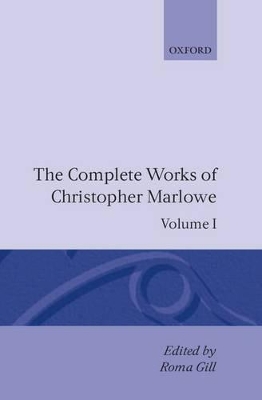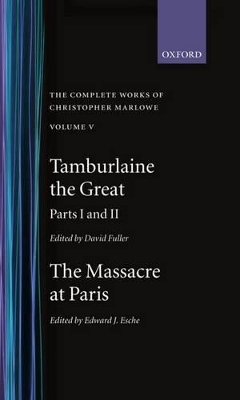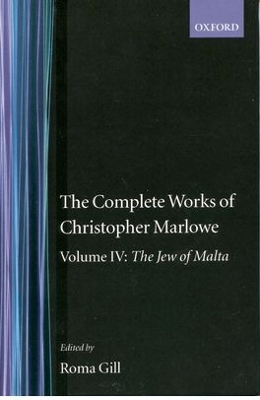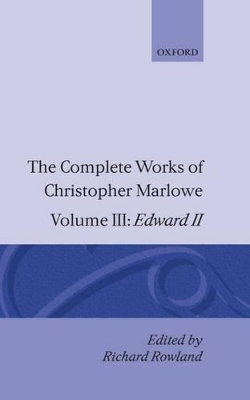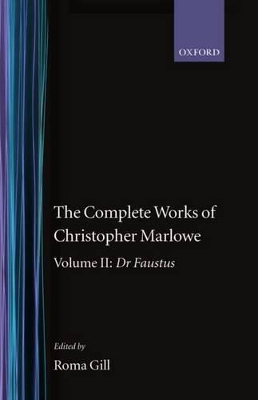Oxford English Texts
5 total works
Despite the modern fascination with Marlowe--particularly with his Dr. Faustus--there has been no edition of his works in the original spelling, with full textual apparatus and a detailed commentary. The Oxford English Texts Complete Works of Christopher Marlowe fills the need for a fully annotated scholarly treatment of the works. Volume I contains all his translations from classical poetry, comparing the English verse with the Latin and Greek originals. The editor discusses Marlowe's skill as a translator and his art as a poet, and provides clear explanations of all difficult expressions and obscure allusions.
This volume, which completes the Oxford English Texts edition of The Complete Works of Christopher Marlowe, contains the two parts of Tamburlaine the Great, edited by David Fuller, and The Massacre at Paris, edited by Edward J. Esche. It is the first time that either text has been presented in an old-spelling edition with a full critical commentary and textual annotation. The introduction to Tamburlaine gives a detailed account of the plays' sources, stage history, and text. The critical discussion considers the fundamental clashes which Marlowe dramatizes; the differing interpretations - often involved with opposing views of the Renaissance - to which these have given rise; and how new critical methodologies, and recent research into occult traditions in the Renaissance, might affect our reading of Marlowe. The commentary brings together the extensive modern scholarship on the plays, offers some new suggestions about their probable stage action, and cites new material from the period to contextualize Marlowe's treatment of war, medicine, religious controversy, and many other subjects. It also draws on scholarship on Elizabethan pronunciation to clarify Marlowe's poetic rhythms, and uses the revised edition of OED to investigate more fully than has previously been possible the originality and inventiveness of Marlowe's language.
The Massacre at Paris survives only in a severely mangled version, which bears many of the signs of a `reported text'; nevertheless, it provides us with the unique example of Marlowe using contemporary French history as his subject matter. The play has been edited from the copy of the Octavo once belonging to Edmund Malone, now held in the Bodleian Library. The edition also presents the single extant leaf of Massacre (Folger MS. J.b.8) in an authoritative form with apparatus, and argues for its legitimacy as a genuine playhouse document, although not Marlowe's autograph.
The Massacre at Paris survives only in a severely mangled version, which bears many of the signs of a `reported text'; nevertheless, it provides us with the unique example of Marlowe using contemporary French history as his subject matter. The play has been edited from the copy of the Octavo once belonging to Edmund Malone, now held in the Bodleian Library. The edition also presents the single extant leaf of Massacre (Folger MS. J.b.8) in an authoritative form with apparatus, and argues for its legitimacy as a genuine playhouse document, although not Marlowe's autograph.
The Complete Works of Christopher Marlowe: Volume IV: The Jew of Malta
by Christopher Marlowe
Published 16 November 1995
Of English Renaissance dramatists, Christopher Marlowe arguably stands second only to Shakespeare in the minds of students, directors, and theatre-goers. Yet despite this fascination with the man and his works, until the present Oxford English Texts edition there has been no complete edition of the works that not only gives them in their original spelling - with full textual apparatus - but also supplies a detailed commentary.
Marlow's Jew of Malta - a very popular play in its day, as entries in Henslowe's Diary testify - ranks as one of the most imaginative creations of Elizabethan drama, having no known antecedents for the main events of the plot, and no known counterpart for its protagonist. Here it is presented in a text derived from the 1633 Quarto, with an apparatus of emendations and a full commentary on sources, allusions, and the meaning of difficult passages.
Marlow's Jew of Malta - a very popular play in its day, as entries in Henslowe's Diary testify - ranks as one of the most imaginative creations of Elizabethan drama, having no known antecedents for the main events of the plot, and no known counterpart for its protagonist. Here it is presented in a text derived from the 1633 Quarto, with an apparatus of emendations and a full commentary on sources, allusions, and the meaning of difficult passages.
The Complete Works of Christopher Marlowe: Volume III: Edward II
by Christopher Marlowe
Published 3 November 1994
Marlowe's highly controversial Edward II concerns the conflicting claims of love and politics, the urgency of homoerotic desire, and the cruelty with which unscrupulous authority can exert control. The boldness with which the work confronts these issues makes it unique in the period, yet this is the first critical edition of the play with full scholarly apparatus for twenty-five years.
Richard Rowland's edition presents an old-spelling text which adheres more closely to the first quarto of 1594 than any edition hitherto. The present volume is the third in the Oxford English Texts Complete Works of Christopher Marlowe. A full commentary and introduction contextualize the play and give an entirely original account of the relationship betweeen the play, Marlowe's own age, and events which immediately followed it. By re-examining textual cruces, new
interpretative possibilities are opened up, and the play is related to the language and ideas of Marlowe's contemporaries. A generous selection from Holinshed, Marlowe's principal source, is also included.
As critics and historians continue to debate attitudes to love, sexuality, and politics during the English Renaissance, this edition of Edward II extends that debate, offering a new understanding of the eroticism and violence of the play.
Richard Rowland's edition presents an old-spelling text which adheres more closely to the first quarto of 1594 than any edition hitherto. The present volume is the third in the Oxford English Texts Complete Works of Christopher Marlowe. A full commentary and introduction contextualize the play and give an entirely original account of the relationship betweeen the play, Marlowe's own age, and events which immediately followed it. By re-examining textual cruces, new
interpretative possibilities are opened up, and the play is related to the language and ideas of Marlowe's contemporaries. A generous selection from Holinshed, Marlowe's principal source, is also included.
As critics and historians continue to debate attitudes to love, sexuality, and politics during the English Renaissance, this edition of Edward II extends that debate, offering a new understanding of the eroticism and violence of the play.
The Complete Works of Christopher Marlowe: Volume II: Dr Faustus
by Christopher Marlowe
Published 5 April 1990
Despite the modern fascination with Marlowe, and in particular with Dr Faustus, there has been no edition of his works which offers original spelling, full textual apparatus, and a detailed commentary. The Oxford English Texts Complete Works of Christopher Marlowe, edited in three volumes, supplies the need for a fully annotated scholarly treatment of the works.
The present volume is devoted to Dr Faustus, which is now edited from the edition of 1604. A new theory of this text and its transmission is presented in an introductory essay, `Dr Faustus, the Textual Problem'; the play is critically discussed in another essay, `Dr Faustus, the Real Problem'. Differing theories of the text are outlined in an appendix, and another appendix selects the substantial passages which make the 1616 edition of the play unlike the 1604 version. Extracts from The English Faustbook, the main source of Marlowe's play, are also appended, and there is a full commentary.
The present volume is devoted to Dr Faustus, which is now edited from the edition of 1604. A new theory of this text and its transmission is presented in an introductory essay, `Dr Faustus, the Textual Problem'; the play is critically discussed in another essay, `Dr Faustus, the Real Problem'. Differing theories of the text are outlined in an appendix, and another appendix selects the substantial passages which make the 1616 edition of the play unlike the 1604 version. Extracts from The English Faustbook, the main source of Marlowe's play, are also appended, and there is a full commentary.
